#Party Loyalty
Explore tagged Tumblr posts
Text
First Principles: Be Americans. Let There Be No Sectionalism...You Are All Dependent On One Another and Should Be One In Union
“Be Americans. Let there be no sectionalism, no North, South, East or West. You are all dependent on one another and should be one in union. In one word, be a nation. Be Americans, and be true to yourselves.” – George Washington, Washington’s Farewell Address, published in the Claypoole’s American Daily Advertiser (September 19, 1796) — In General Washington’s Farewell Address (first published…

View On WordPress
#"Resistance"#American#Citizens#Common Interests#Democratic Party#Dependent#Electorate Map for 2024#Factionalism#Farewell Address#FEMA#First Principles#Florida#Freedom#George Washington#Hyperbole#Independence#Liberty#Nation#One America#Partisan#Party Loyalty#Pettiness#Policy Differences#Revenge#Second Term#Sectionalism#The American Presidency Project#True To Yourselves#Trump#Union
0 notes
Text
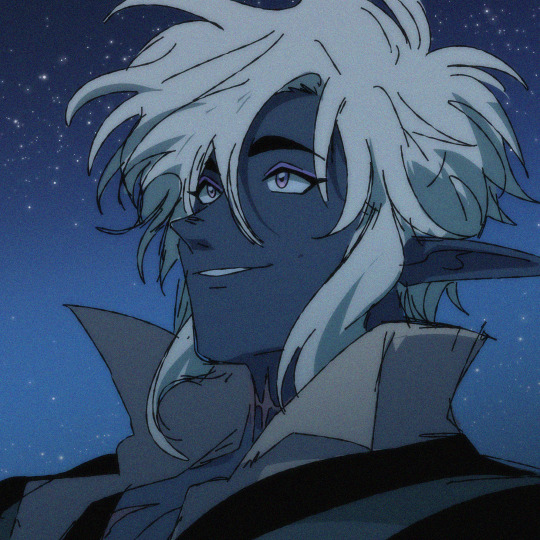
#dungeons and dragons#dnd art#dnd character#dnd oc#drow#warlock#dandelion treehollow#feeling not good so i drew the good boy#(goodness up for debate)#he is rather dog like in loyalty though#loyal to the party but also loyal to a bad master (his mom)#i am struggling to make art lately eh#drawing him smiling all sweet as i debate whether i should have him have to rip a tooth out to summon his magic book back#edit oh my god i forgot his eyeliner it's been fixed#sorry dude
753 notes
·
View notes
Text
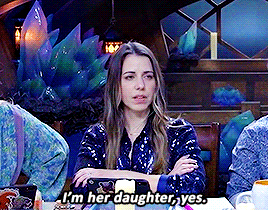
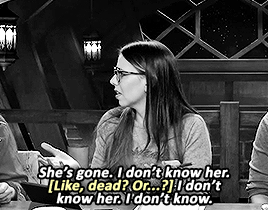
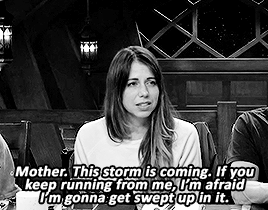
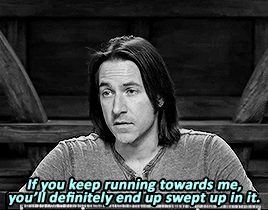
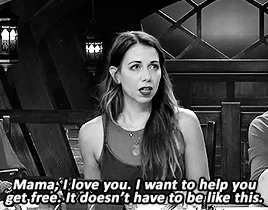
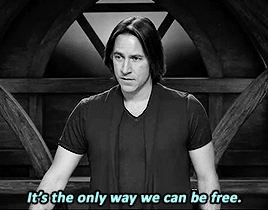
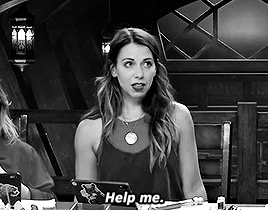
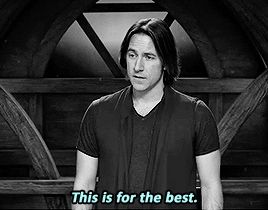
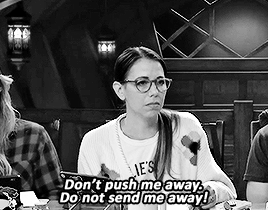
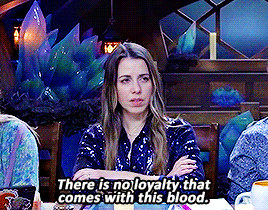
We want to destroy my mother. (insp by @dadrielle)
#critical role#criticalroleedit#imogen temult#liliana temult#laura bailey#matthew mercer#gifs#*#*cr#cr3#cr spoilers#angst tag#cr meta#*meta#scheduled#3h12m c3e88#18m c3e12#3h17m c3e42#3h42m c3e51#4h20m c3e51#1h35m c3e49#i think this gifset might be a little bit unfair to liliana from a third party perspective but#i think it's Very Real for imogen. to feel like she reached out so many times and the loyalty there was so fucking flimsy#barely there to begin with and then gone in an instant as everything turned to red mist#thinking about how laura on 4sd a while ago said imogen is so fucking sick of it she's sick of having that hope#her reality is that her mother no longer has any loyalty to her and the pain of thinking she does isn't worth it anymore#:((((#'help me.' 'this is for the best.' breaks my H E A R T :(((((((((#and matt's fucking Smile afterward. speaks a thousand words#thanks rj for the discord message that kicked this off!!!
981 notes
·
View notes
Text
Honestly I understand why Megatron is obsessed with Optimus Prime. Megatron is doing his darndest to run an evil army, but because it's an evil army everyone is constantly betraying him. He tells them infighting is destroying them, heck, he's even tried to be empathetic, and they turn right around and attack either each other or (more frequently) him. Is it any wonder he's almost happy to see Optimus on the battlefield?? At least with him, Megatron knows what to expect--bro will be there to fight him every time. Simple! Consistent! An opponent who's actually in front of him instead of behind his back! What a relief...
In short Optimus is basically Megatron's comfort item and I don't blame him for that
#transformers#transformers prime#megatron#optimus prime#megop#megoptimus#this is specifically inspired by tfp but i am sure it is true of other iterations#i just cracked up when i watched the episode where he was like 'yo we are seriously losing people let's keep it together'#'starscream sure you can come back. dreadwing i'm sorry ik that's rough for you since he got your brother killed etc. appreciate ya'#'loyalty is just super important to me rn' and then dreadwing IMMEDIATELY goes and tries to kill starscream and megs has to kill him#like he really is trying (to do evil‚ i do want to emphasize i am aware of that lol) and it is just not working#bro is not a good manager it seems :P#kay can i just catch my breath for a second#kay has a party in the tags#kind of meta but not really#maccadam
281 notes
·
View notes
Text
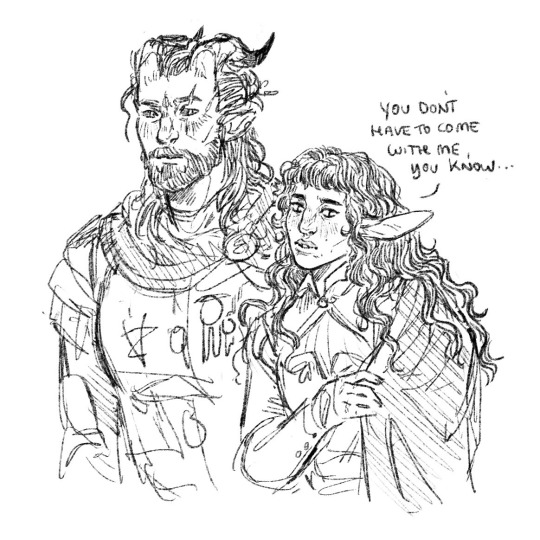
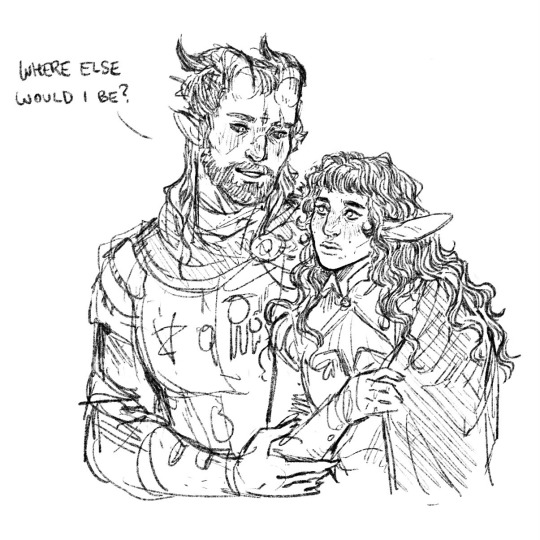
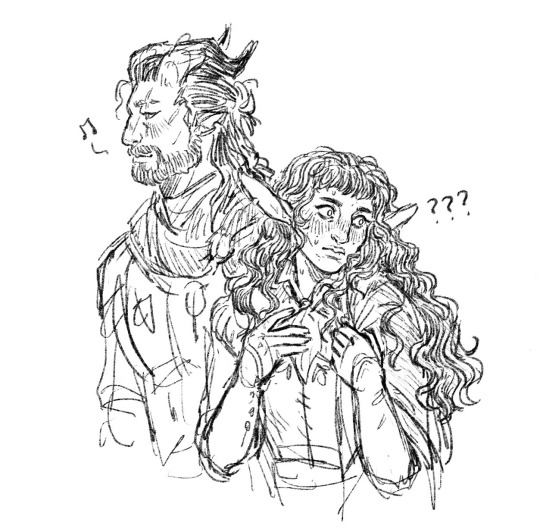
If these idiots don’t kiss soon I’m gonna go insane (OCs)
#Tychus (tiefling paladin) keeps blindsiding Magda (my eladrin warlock) with incredibly romantic moments#and Magda is just like 😳 okay but he probably just sees me as a friend#right?#drawing#digital art#dnd#dnd character#oc#Magda#Tychus#original character#this whole party cant go a session without pledging their undying loyalty or nearly dying for each other etc
306 notes
·
View notes
Note
what does it mean when people say stuff like individual morality or action is incompatible with class analysis or class struggle?
alright so like one of the key ideas about class analysis is the idea that classes (as a whole) have economic interests that affect all their members but don't extrapolate out to an individual analysis.
for example, let's say that you can't find a job, and somebody offers to pay you below the table for below minimum wage. it's in your individual interest to do this--it beats having no job! but as a member of the working class, once this practice becomes normalized, suddenly the standards of pay for everyone are lower because people know that they can just pay less than minimum wage under the table. competition between workers for jobs drives wages down for everyone, leaving them all in a worse situation overall even if each individual choice to scab, to accept lower pay, to resist unionization, etc, leaves the person who makes it better off. cf. karl marx on what happens when wages and working conditions deteriorate:
The labourer seeks to maintain the total of his wages for a given time by performing more labour, either by working a great number of hours, or by accomplishing more in the same number of hours. Thus, urged on by want, he himself multiplies the disastrous effects of division of labour. The result is: the more he works, the less wages he receives. And for this simple reason: the more he works, the more he competes against his fellow workmen, the more he compels them to compete against him, and to offer themselves on the same wretched conditions as he does; so that, in the last analysis, he competes against himself as a member of the working class.
— Karl Marx, Wage Labour & Capital
similarly, any individual member of the working class is completely dispensable and replaceable by capital. if one person refuses to work unless they're paid a higher wage, they'll be fired and replaced with somebody who doesn't. the individual worker has no economic leverage whatsoever. but the working class has incredible economic leverage! and so does the intermediate stage between the working class and the individual--organized segments of the working class (e.g. trade unions) have economic leverage. if one person strikes, the capitalist can fire them. if 40,000 people strike, your industry is going to shut down.
so the reason why class analysis is compatible with individual action is that your incentives measurably change when you start organizing--it's in the interests of the individual to compete, but in the interests of the class to cooperate. and obviously you cannot just expect everyone to spontaneously coordinate! you, the individual, are disposable to capital! if you, personally, refuse to take the under-the-table offer, either on moral grounds or because you recognize your class interest, your neighbour's going to take it--unless you and her get together and agree that neither of you will take it. that's the only way that the guy making the offer is going to have to give in and offer the job for a living wage.
and this is what organization is--trade unions (although they have severe limitations!), communist parties, and other worker's organizations allow the working class to pursue their collective interest--which can only be pursued by collective action, because engaging in the strategies of collective action as an individual, without the cooperation of your peers, is high risk for no reward.
#ask#marxism#the effects of electoral politics are far far more limited in scope than trade union activity but the same holds for voting#which is what the original post i was responding to was about#if you 'vote blue no matter who' then the bourgeois party you're showing loyalty to--#--will have no reason whatsoever to even marginally offer to improve your life#and if you as a solitary individual tell joe biden 'well im not voting for you unless you promise so and so social democratic reforms'#he is gonna be like lol lmao dont care#while if you and your several thousand friends all get together and say that#he will at least be obligated to pretend to care before immediately reneging on it bc he ultimately serves capital
862 notes
·
View notes
Text
starting yet Another relisten of dames and dragons presented by legendlark, my beloved.
i've just finished the first arc and i think there's something so special about the pairs who fall off the island together and how it kind of sets the scene for those relationships for the rest of the campaign, in my mind.
#like... laika and maeri. i can't say anything about them that hasn't already been said better#it's like are they in love.. maybe#(yes)#but regardless it's laika's unwavering loyalty for her throughout her whole time in the party and then even later when she comes back#like. they held each other while they fell from the sky 🥺#it makes me crazy#but it's really fran and corbin for me#idk they are so siblingly to me#like they hate each other they are so SHUT UP CORBIN but they're everything to each other#it rips me apart every time i listen to the end of the weeping god and fran disappears and he's digging through the rubble#and it's like sure. laika left. maeri also disappeared#slake is still there. not for nothing. but they're not estran#slake is trying to tell corbin but he's just. she has to be here#he can't lose fran#fran is the only person left who has been through EVERYTHING with him#they held each other while they fell from the sky 🥺#i'm just obsessed with those two relationships in particular and them falling from estra like that makes me crazy#it's like. you can't have laika without maeri. for fran and corbin. you can't have one without the other#and i don't mean to ignore slake bits just that they're not here yet#i love slake and maeri's relationship A Lot too but it is different from the estran's relationships to each other in my mind#I LOVE LEGENDLARK#PODCAST OF ALL TIME#dames and dragons#legendlark#mine
18 notes
·
View notes
Text
Thinking about Grian being forced to fight his partner at the end of season one. Him being devastated, almost unable to do it, even though Scar betrayed him first. "I'm sorry". Him jumping off the cliff himself when it was done. "I don't feel good."
Grian being attacked repeatedly by his closest allies once they turned red in Last Life. Being cornered and nearly trap killed by Mumbo and Tim. Turning on them because they were turning on him first. The way he was so distraught to lose them. "My friend!"
Him killing Bigb inadvertently in Double Life. It wasn't on purpose per say. He wasn't thinking about it, he just wanted to get a kill, he needed to leave his mark on the season, because he was red, and that's what red names do. The way he didn't realize what he'd done until after the fact. "I am such a traitor."
And then finally Limited Life. Grian turning on Scar in the middle of a fight, literally stabbing him in the back in the heat of the finale, and not regretting it. "You gotta go."
#trafficblr#grian#something something the life series dissolves personal loyalties and standards#it isnt a grian thing#its an everyone thing#this game *forces* you against your friends#it pits you against the people you love most over and over#until fighting them doesn't hurt as much#until being betrayal doesn't hurt as much#for *either* party#because it's always like this#and it's noones fault#but there's always a winner and a loser#in any team#and at this point#everyone gets that#they *have* to get it.
104 notes
·
View notes
Text
i wish me3 had loyalty missions it would be so sooo good. assisting some shadow broker agents with liara. joining kaidan/ashley on one of their first spectre assignments to reassure them. helping garrus to evacuate his family from palaven. sticking around with tali on rannoch to make sure quarians and the geth are doing fine. handing a serious job to james and guiding him through it as a part of his n7 training. going on a task with edi to help her adjust to working with other people as a person and not as a vi. visiting javik's squad's resting place with him. doing little favors for your friends in the middle of a war because life itself hasn't ended yet and you want to make it a little easier for them while you have some time left
#'but there's no time for that the reapers are coming' there was enough time for a whole ass party#i guess shepard can spare a day to go do some good with their friends#also i really miss loyalty missions from me2 and it is a shame some guys from me3 squad didn't get anything like it#encounters on the citadel were fine but that's not It. i want a whole quest#mass effect
187 notes
·
View notes
Text
Worlds #1 complainer about "dog motif" fans accidentally makes story with extremely central, predominant even, dog motif
#I wasn't thinking of it that way because it's like. For lack of a more appropriate word diagetic?#Like it's not invoked symbolically in the narrative or just with association it like. Involves actual dogs and the in-universe culture's#view on dogs. Rather than dog imagery to represent like Loyalty or Devotion or etc#The biggest underlying theme is kind of the human/animal relationship and animals as means of externalizing human states#cultural desires and fears etc etc etc#And in-universe dogs have a very complicated place in this cultural context where they tread the thinnest of lines between#being noble loyal valuable animals and unclean lowly despised scavengers. Both are the same animal and it all depends on the#role they play. And then this divide is narrowing in the context of a famine where the dog becomes competition#for food/consumer of the dead/possible desperation food source itself and one that contaminates the consumer in the process#Street dogs as kind of the ultimate representation of cultural anxieties of enemies infiltrating from within and without#despised elements of the culture that are omnipresent nonetheless etc etc etc etc#And then a cast of main characters where ALL of them in very different capacities are balancing a delicate line of trying their#best to play roles to remain in the 'valued' category and not fall into the 'despised'. Some doing better than others or having#more privileged places in this dynamic than others but all under tremendous strain from it#In a condensed high pressure panopticon setting of a pilgrimage/war party surrounded by like some of the highest#members of the social elite/literal royalty/etc#And anyway bottom line EXTREMELY central 'dog motif' going on here literally every main character interacts with a#'dog motif' in some capacity . Failed fucking step 1
16 notes
·
View notes
Text




Hamilton Burger was the best prosecuting attorney that ever faced Perry Mason. You'll notice that he's not in season 3 of the show. Apparently, William Talman, who portrayed Hamilton Burger, allegedly smoked marijuana at a party that he attended. The party had been raided by the police. Although, William entered a non guilty plea to misdemeanor charges, he was fired by CBS because they said that he had violated his morals clause. The fans were enraged as was the cast. The cast said that they might not return to the show unless CBS rehired William Talman. As we know, CBS did rehire him, and all was as it should be, once again, on Perry Mason. That's spectacular loyalty to a good friend. I love the cast for standing by him during this ordeal. I have great respect for what they did. 😁😍
#Perry Mason#William Talman#Hamilton Burger#marijuana#party#raided#fired#CBS#morals clause#loyalty#friendship#respect#love#happiness#thank you#sharing#joy#classic TV#black and white tv#50s tv#60s tv#i love this show#i love these people#very cool
19 notes
·
View notes
Text

but strictly speaking, i’m still on track
[abel, he/she]
#my art#my ocs#oc: abel#this is so small but actually the meaning big#its abt her struggling to balance servitude to her patron and loyalty to her party#if u care heart emoji#dnd#dnd oc#the new age#digital art
16 notes
·
View notes
Text
You're telling me the other rat grinders were not at the Frostyfaire Folk Festival supporting Ruben?
Some adventuring party
#where's the party loyalty#dimension 20#fhjy#fhjy spoilers#d20 spoilers#fantasy high junior year#rat grinders
42 notes
·
View notes
Text
honestly ?? amy in cryptic castle is so funny to me bc she's pretty much her cheery self the whole time but also has the undertone of, 'gee fucking whizz i am sick of this shit'
like ??? the way she talks abt the black arms and eggman's robots and eggman himself when he appears in the egg breaker boss ? hilarious
she is so done
#bee blabs#there's a lot going on in this lvl#and her demeanour thru the whole thing is actually quite intriguing to me#like- she's saying way less abt what's she's rly feeling#bc tbh i'd be stressing tf out if i lost my friends in a creepy ass castle#she also doesn't quite express loyalty to either party ??#she scolds shadow for destroying eggman bots but-#she'll do it herself#and she does say she's annoyed at the presence of all enemies in general so-#honestly this new writing piece has rly made me think lots abt this stage whereas i wouldn't have before#it's cool !!#i am worried this piece may drag on like it does even when i have a proper outline#but it'll be wicked#esp since i'm finally writing something completely set in the canon#(long time coming beeboo)
8 notes
·
View notes
Text
i think one reason joplittle is compelling despite little onscreen interaction is that they're both loyal to crozier til the end. sort of sons to him in a way, because out of all the men silna and crozier pass, the only ones we see him touch are jopson and little. plus there is their contrasts. the cool unflappable steward pouring tea and the nervous scared first lieutenant giving orders. and little's smile when he finds out it's jopson getting promoted is so adorable
#uh and they're both pretty lol#of course they're not perfect in their loyalty#when crozier reveals his intent to send a party for rescue blankey confidently says edward won't do it#and jopson gossips about crozier's drinking#but little begs the others to go against crozier's orders to rescue him#and jopson lovingly cares for crozier through his withdrawal#and certaintly crozier wasn't perfect in his loyalty to them either. sending little back out into the cold to steal whiskey for him#i love them all and ive really been carrying on about them wow#the terror
25 notes
·
View notes
Text
So, watched live action One Piece and now I'm watching/reading the OG stuff. No where close to done but my brain decided to fixate on Arlong so I can't help but talk about him a bit.
Something that I find kind of interesting about Arlong is that if you read his backstory then go back to the main Arc he was in you actually realize he's way more mellow then he was in the past. Now, he's still awful but given what we're shown of him in Jinbe's flashbacks I think it kind of shows that he did, in a weird way (and not in the way Fisher Tiger would have wanted) changed due to Fisher Tiger's words on not killing humans.
In the past Arlong was constantly advocating for killing humans and terrorizing them so they'd learn their place. He never warms up to Koala despite the rest of the crew--including his own friends coming to like her. Everyone is sad to see her go even Kurobi who is later one of the worst in Arlong's crew.
After Fisher Tiger's Death it's clear Arlong was going to kill everyone in Koala's village (and no doubt would have killed Koala). He was stopped and put in Impel Down--a notoriously hellish prison (run by humans). It's not clear how long he was there, but probably at least a few months, which is a long time in a place like that.
After his pardon he leaves Jinbe and the Grand Line. Presumably he started taking over villages pretty soon after.
Now, what I find interesting is that this is by far the most justified Arlong is in his hate of humans, yet it's also the nicest we ever see him being to them. Before Fisher Tiger's death and reveal of being a slave, or his time in Impel Down Arlong hated humans because of things that although affected him were not things he himself suffered.
Arlong was never a slave, and at least Hachi, Chew and Kurobi were also never slaves. They were all orphans and this might have been the fault of human pirates who attacked Fish-Men Island, but we don't know that for sure, and it's never brought up as a grievance of theirs. They know Fish-men and mermaids are taken as slaves and they surely get racist treatment from the visiting humans, but they don't have first hand experience with human cruelty--like slavery or murder.
Not until Fisher Tiger is killed for helping a human girl go home after being a slave do they experience real loss due to humans. From there, Arlong is captured and imprisoned in Impel Down where he was surely treated terrible by humans during his time there (given they treat everyone bad there). Yet, despite saying he's the anger of the fish-men he does not actually kill nearly as many humans as you'd think, given how he acts in the past.
In fact in a lot of ways he seems to try not to kill humans if he can get away with other methods of control instead.

This is when he takes over Nami's village. This is not long after Fisher Tiger's death which Arlong wanted to kill an entire village for. Yet, now, despite a huge uprising happening, with nearly the entire village of humans trying to attack them, he's not going for the kill.
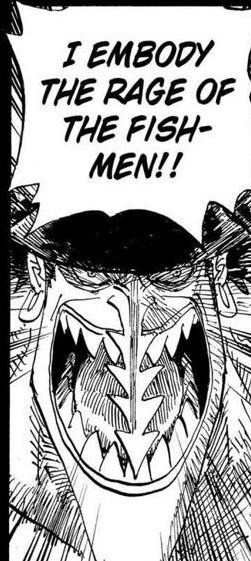
This is him probably less then a year before the panel above. He's furious and saying he embodies the rage of all Fish-Men. Yet he arrives to the village and tells his crew not to kill anyone despite their open hostility.
Yes, he wants money because he (supposedly) wants to take over the East Blue(world?) but he's already got his money and killing a few villagers should be no big deal--he plans on taking over more anyway.
In the end though, he does only kill Bell-mere due to her lack of money. She makes a good example, of course, but he was more then willing to let her live, despite her shoving a gun in his mouth before she used the money for Nami and her sister.
This is a huge change in a short amount of time.
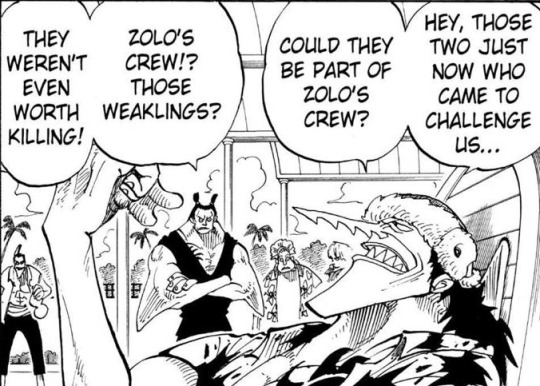
This is another time he and his crew don't kill for zero reason. They have been attacked all day by members of Luffy's crew. Zoro absolutely beat the shit out of his guys earlier that day. He was furious when Usopp dared to fire on him (to the point of flipping a damn house) but now they just leave two strangers (so not cash cows) alive? Usopp--was worth Arlong's anger, but suddenly two other random humans doing the same thing aren't worth killing?
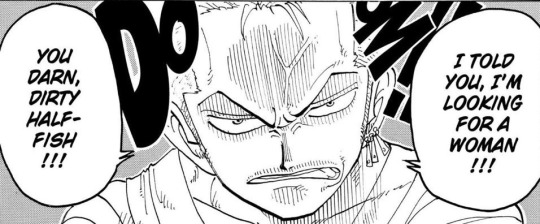

This is how he responds to Zoro being what I would assume is racist given what Arlong says. He does not know who this guy is--Zoro was found tied to a boat and just brought to him and his first words are racist. Yet, Arlong lets it 'slide once'. Again this is the guy who hit a child for no reason except she was human way before he lost Fisher Tiger or went to the human torture prison. Yet now he's putting up with a stranger calling him racist names?
Going back to Usopp, this is how furious Arlong was when he was attacked:
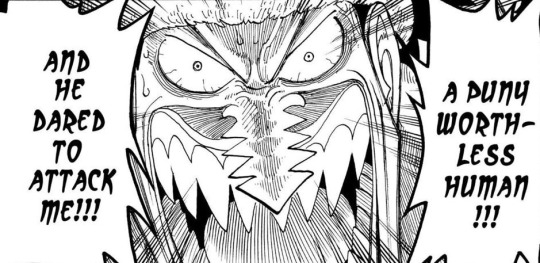

He's so furious that for a moment he's willing to destroy one of his money making villages, right after losing one not to long ago, just to kill one human guy who didn't actually hurt him, nor are they a rebelling villager.
Yet this is how he acts once Usopp gets caught.
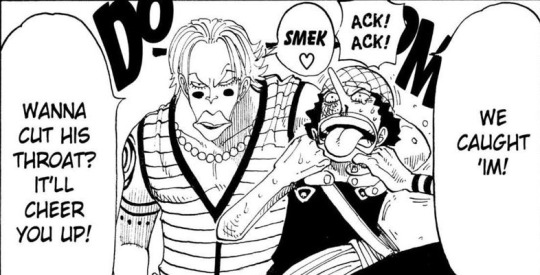
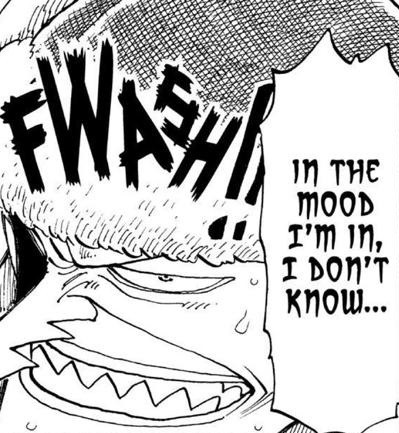
This is after he comes back to Arlong Park to find most of his crew beaten to a pulp by Zoro. He flipped a house he was so pissed off at Usopp, ready to destroy an entire village that he gets good money from (and which he needs to keep Nami around) but suddenly after his crew is hurt he's not in the mood for killing Usopp ASAP?!
Also, he was only in Nami's village because he saw Genzo had a weapon. He thought the village was going to rebel like the last one and he wanted to nip it in the bud and kill Genzo before it got to far. That was the only reason he was there and yet, after Usopp makes him absolutely furious he and Kurobi leave Genzo alive.
Flashback Arlong, who was barely held back by Fisher Tiger would never have left any of these humans alive. They were in his eyes disrespectful, not fearing him like he wants, and most did not give him money--the only benefit he sees to keeping humans around. Yet, he lets all of them live--maybe he has plans to kill them later, but again, past Arlong would kill them ASAP.
I know that the most likely reason for this is because Oda didn't have everything with Arlong and Jinbe's past in his brain at this point (there's ten years or more between these parts in the story). Not only that he can't have important people like Usopp and Zoro being killed off. He also seemed less willing to kill characters off in the start of the manga, which is why Genzo and Zoro's friends lived (killing Genzo would also have been way to mean to Nami).
But from an in character perspective you could see this as Arlong being affected by Fisher Tiger's words of not killing humans. No, he can't fully follow that rule, let alone Fisher Tiger's orders to not treat humans badly. Arlong has hated humans for far to long, and he was barely managing to restrain himself for Fisher Tiger despite respecting/caring for the man with his whole heart.
He can't not kill humans or treat them like crap--but he can come up with excuses that limit how many he kills. A 'well, if they pay me, they can live', or a 'they're to weak to kill so I won't', or 'I'll give this guy a warning for insulting me before I kill him'.
He lets his crew drag him away from Nami's village because he doesn't really want to destroy it (for monetary gain not kindness obviously). Kurobi doesn't kill Genzo because he wasn't told to so he lets him off, despite that being the only reason they came in the first place (despite defiantly knowing killing him wouldn't get him in trouble and is Arlong's intention). That gives Arlong time to calm down and by the time Usopp is caught he's more willing to take the time to ask him what he's doing there and then let Nami deal with him.
Part of it might also be Arlong knowing Jinbe will come kick his ass as soon as he finds out he's been killing/terrifying humans. He can bribe the Marines, but only to a point. If he was slaughtering every human that looked at him wrong or said something racist he'd be to much of a threat for higher-up the Marines to ignore. Eventually they'd tell Jinbe to deal with him and Jinbe would. Arlong would know that and given he was beaten easily by Jinbe he also knows he'd lose immediately (and either be killed or sent back to Impel Down).
Either way, he's showing some restraint even though he doesn't have someone like Fisher Tiger, or Jinbe directly telling him to. For whatever reason Arlong is way more willing to keep humans alive if he can come up with an excuse for it. Which I find kind of fascinating and adds some depth to his character that I don't think was necessarily intentional, but is the strength of the writing that Oda was able to add something years down the line that somehow didn't conflict with what's already established.
#one peice#arlong#Jinbe#i just find him neat#is this a meta?#i might also give my thoughts about why he liked Nami so much#yes he treats her like crap and he (supposedly) needs her maps#but he would not be seen with Koala at all#he is not in any of the panels of her bonding with the crew even in the background#yet he throws parties when Nami comes back?#after he outright says she's tried to off him multiple times#he even defends her loyalty to the crew--SHE TIRED TO KILL YOU MULTIPLE TIMES!#but he fucking trusts her?!#are you kidding me!#also he hates Koala pre-Tiger's death but accepts Nami and fights tooth and nail to keep her around#again maps are important but really? he can't find anyone else to make maps? can't have someone on the crew learn how to make maps?#also he has a shit ton--must have all of East Blue Mapped#which is kind of why I say he supposedly wanted to conquer East Blue (the world)#it's been 8 years and he only has 20 villages#sorry but dude isn't trying at all#plus he knows he can't beat Jinbe or the Grand Line Marines#so i think he's just saying shit to feel better#probably would have sit on his ass in Arlong Park until he died of old age#Ends up being a slightly more evil Walt Disney with his knock off amusement park for his 30+ year-old fish-men friends#fucking love this dude; he's pathetic
42 notes
·
View notes